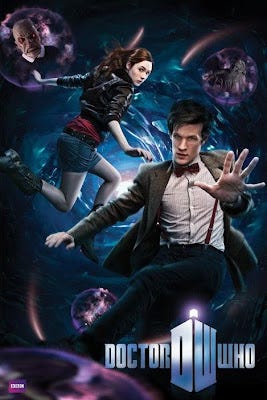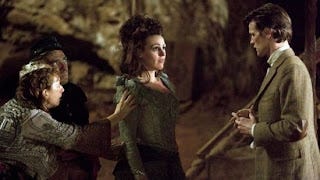"Doctor Who": Farewell Series Six Part One Extravaganza!

One of the things I’ve always done while TV blogging is a “farewell Season X extravaganza,” a retrospective of all the good and bad the latest batch of episodes had to offer. This June, however, some personal issues stopped me from publishing my “Extravaganza” for Doctor Who: Series Six Part One. I had about half of it done, but it never did get finished. I’ve been re-posting Doctor Who reviews for the last four weeks, but today, you actually get something brand new: my newly completed Doctor Who: Farewell Series Six Part One Extravaganza! It’s about three months late, of course, but since the second half of the season starts this Saturday night on BBC America, now’s a good time to take one last look back at the year’s first set of stories. First, there’s a season report card, with brief thoughts on the first seven episodes of series six (and links to my full reviews of those hours); next, there’s a brief review of this portion of the series as a whole, and finally, a set of awards that look at which characters and moments have resonated most strongly so far this season!
Enjoy, and come back this Saturday night for my review of Let’s Kill Hitler! Read the Extravaganza after the jump…
Series Report Card: Mini-Reviews:
1 and 2: The Impossible Astronaut and Day of the Moon

As good a season premiere as I’ve ever seen; Steven Moffat threw down a pretty monstrous gauntlet for the season, not just by killing a future version of the Doctor within the first ten minutes, but also by weaving a wondrously complex, intricate, and imaginative tale that set the bar very, very high for the next eleven episodes. In addition to giving us Stuart Milligan’s wonderful Richard Nixon impression and sci-fi standard Mark Sheppard as FBI Agent Canton Everett Delaware III, this two-parter also introduced us to the Silence, one of Moffat’s most frightening creations. A
3. The Curse of the Black Spot

Viewed on its own merits, Black Spot is a fun, decent little Doctor Who outing with a very creative ending; it’s far from great, but it’s certainly good. Put next to the brilliance of the two-part premiere, it looked very weak in comparison, which is more a problem with season structure than any particular fault of the episode. C+

We’d been hearing word about Neil Gaiman writing a Doctor Who episode for so long that by the time the episode aired, I for one was wondering if anything could live up to our expectations (Gaiman himself expressed this fear on Twitter). But when The Doctor’s Wife aired, all fears were assuaged; this is one of the greatest Doctor Who stories ever told. The premise is so obviously brilliant – the spirit of the TARDIS gets put in a human body, allowing it to converse with the Doctor – that it’s a wonder nobody though of it before. More importantly, the execution is perfect, from the gorgeous, cinematic production values to a tremendous guest performance by Suranne Jones. Gaiman also gave Matt Smith some of his best material yet, and if Smith hadn’t already fully established himself as a legendary Doctor, he certainly did so by the end of this episode. The Doctor’s Wife is a love-letter to Doctor Who fans, and we love it right back. A+
5 and 6. The Rebel Flesh and The Almost People

A real cracker of a two-parter, one that starts slow but gets better and better as it goes along. A thoughtful study about the nature of humanity disguised as a survival thriller, writer Matthew Graham put us on the edge of our seat while giving us something to think about. The second and stronger half also gave Matt Smith another chance to show off his incredible talent, this time by playing two identical, interacting versions of the Doctor. B+

I recently re-watched this episode, and I realized it’s much more impactful on a second or third viewing. One could argue that Moffat’s vast imagination got the better of him this time – the first half comes across as a wee bit clunky on an initial viewing – but when I watched the episode again, aware of all the twists of the final half, everything became clearer, the action more fun, the laughs bigger, and the darker moments of devastation all the more powerful. An excellent mid-season finale, one that reveals how integral River Song has been to the season thus-far, even off-screen, but more importantly, one that leaves us with many exciting possibilities for the future. A-
Series Six (Part 1) in Review:
It’s hard to judge this set of episodes on their own merits; as satisfying a “finale” as A Good Man Goes to War is, it, like the rest of the season thus far, is really all about putting the pieces in place for the second half of the year. These episodes did that spectacularly, judging by the ridiculous levels of excitement accompanying the mid-season premiere, Let’s Kill Hitler; but this first set of episodes was also entertaining, inventive, and featured unholy amounts of fun from start to finish – and that’s what Doctor Who is all about.
We obviously can’t compare series six to Moffat’s inaugural year, series five, yet, seeing as there are six episodes still to air, but so far, I’d say this is a very impressive follow up to a season I regard as one of the finest in the history of television. It’s not quite up to that level yet, but with the exception of Curse of the Black Spot, I loved all of these episodes in different ways, and with all the stories waiting to be told in the year’s second half – the Doctor’s first meeting with River, the Silence blowing up the TARDIS, and, of course, the Doctor’s own death – I wouldn’t be surprised if, when completed, this season stands just as tall as the fifth.
I also have to note how impressive the cast has been this year. Matt Smith could have just spent the season resting on his laurels, doing the same things he did last season, and we’d still call him brilliant. Instead, he’s expanded his performance, showing us sides of the Doctor that are funnier, darker, fiercer, and on occasion, far more introspective. Each and every episode this season has given Smith a standout moment, and from The Doctor’s Wife on, a sustained 45-minutes of standout moments. His performance comes to a rousing crescendo in A Good Man Goes to War, as the pressure the Doctor’s been living under – knowing Amy was a ganger but being unable to say it – boils over in a mixture of pride and rage. There’s a moment in this episode, when the Doctor comforts a dying Lorna Bucket by pretending to be away of their history together (a history that lies in the Doctor’s future), that is as good a moment as Smith has ever delivered. And just look at the unrestrained glee on his face when he learns River’s secret. Brilliant, brilliant stuff.
Karen Gillan, meanwhile, has had to go to some new places as well, in accordance with the increasingly dark events of Amy’s life. Gillan still has all of Amy’s spunk and wit down pat, but I really enjoyed watching her struggle to trust the Ganger Doctor in The Almost People, or her bravery and heartbreak during A Good Man Goes to War. Arthur Darvill, meanwhile, has integrated himself quite nicely into the main cast, and I love having Rory around on a weekly basis. Moffat and company have done a wonderful job making Rory a real hero over the last seven episodes, and Darvill has illustrated that shift beautifully. Finally, there’s Alex Kingston, who has been so good as of late that I really, really her she becomes part of the main cast next season; she’s done enough for the show that she absolutely deserves to have her name play over the theme song.
Series Six – Part One Rating: A-
Series Six Mid-Season Awards!
I’ve always done this section at the end of a TV Season, but never before for Doctor Who; you’ll find my usual list of awards (MVP, Best Guest Star, etc.) along with a few new ones inspired by this show’s most unique elements.
Mid-Season MVP: The Doctor
I usually try to pick a compelling supporting character for the MVP award, but during these last seven episodes, I was blown away by the actions of our titular time lord. I’ve waxed poetic about Matt Smith, but credit also goes to Steven Moffat and the rest of the writing team for giving the Doctor almost overwhelming amounts of compelling material. If starting the season with the Doctor’s death wasn’t enough, we’ve also had the Doctor instilling paranoia in Richard Nixon, discussing what it means to be a captain with pirate Henry Avery, speaking to the spirit of his beloved TARDIS, interacting with an identical copy of himself, and finally, going to war. This has been a great year for the Doctor; with Smith and Moffat at the helm, I don’t think that’s going to stop anytime soon.
Best Guest Star: Mark Sheppard as “Canton Everett Delaware III”
I really hope we see Canton again before the end of the season, because he’s one of my favorite Doctor Who guests of the revived series. Mark Sheppard has appeared on pretty much ever modern sci-fi show imaginable, and while he’s certainly an obvious choice for this role, he didn’t phone in the performance, and instead gave the character a very unique personality. The fun thing about Canton is that while he’s extremely competent and dedicated, he’s also laid-back, and accepts that there are aliens and blue boxes that are bigger on the inside with a grin, rather than throwing out a long series of questions. He’s no-nonsense, even when it comes to demons, and that makes him a very unique character; the final twist about his sexuality only made him that much more awesome.
Best Alien Enemy: The Silence
The Silence are, essentially, Moffat’s incredibly scary Weeping Angels without any weaknesses. The Angels defend themselves by only moving when they aren’t looked at, which is extremely frightening, but the Silence can only be remembered while one meets their gaze. That’s a whole new level of fear, something Moffat exploited to great effect in the opening two-parter. The Silence are also incredibly powerful and crafty, and while the Doctor drove them off of earth in Day of the Moon, I’m sure they have something else up their sleeve.
Most Shocking Plot Twist: Amy was a Ganger the Whole Time
I could easily go with the Doctor getting offed in the first ten minutes of the season, or the discovery that the little girl is a time lord, or the revelation of River Song’s heritage. All of those are fantastic twists. But for sheer visceral thrill, nothing quite compared to the twist absolutely no one saw coming – that Amy hadn’t actually been in the TARDIS for the entire season. It’s the rare twist that comes out of left field but makes perfect sense, and thanks to Matt Smith and Karen Gillan’s intense performances during the scene, the entire sequence was incredibly powerful. I’ve watched the episode another time or two since it aired, and even though I know it’s coming, my reaction – breathless shock – is still the same.
Best Episode: The Doctor’s Wife
Like I said above during the “report-card” section, Neil Gaiman’s masterpiece is a love-letter to Doctor Who fans, and is brought to life with some of the best production values in the show’s nearly fifty-year history.
Best Use of Time Travel: The Doctor Hosting his own Funeral
One of the reasons why Steven Moffat is the perfect man to write Doctor Who is because he can think of time on a macroscopic level, which is different than past Who writers like Russell T Davies writers who would look at things microscopically. Before Moffat came along, we were used to seeing basic cause and effect, where the Doctor lands in a time period, has an adventure, and leaves. Moffat likes to tell his stories, however, across all of space and time, and there’s no better example of this than the season’s opening sequence, where the Doctor invites his three best friends to come watch his murder and give him a Viking funeral. Best of all? The Doctor also invited his younger self, who has no idea what lies in his future…
Nor do we, the audience, but I think it’s safe to say we’re going to find out over the course of the next few weeks. What will Part Two of series six bring? The premiere – Let’s Kill Hitler – airs this Saturday at 7:00 PM on BBC America, and my review of the episode will be up an hour or two after the episode finishes!

